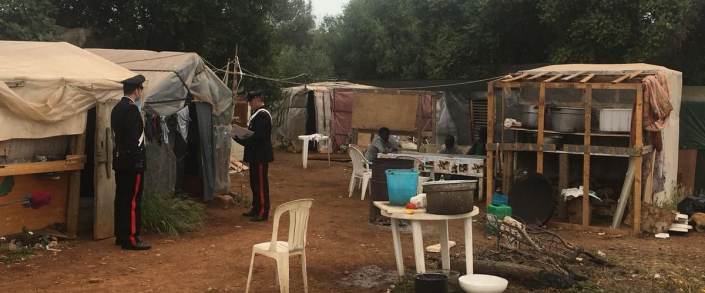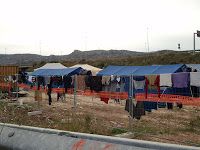The “bosses” of Cassibile
from Argocatania
Cassibile,
Siracusa. Every year from April to June, the town’s population of 5,000 (300 of
whom come from Marocco) increases by several hundred due to the arrival of migrant
workers who come for the annual potato
harvest. We spoke to Alfonso Di Stefano from the Catania Anti-Racist Network
about the living and working conditions of the migrants. The problems are
foremost linked to the logistics and organisation of the work. In general,
those arriving come from other parts of Italy and other harvests in what
can be considered a true transhumance of migrant work in the countryside of the
South. In the last couple of years, however, there has been an increase in the
number of foreign workers from the North of Italy due to an increase in cuts
and job losses in various industries.
The already
existing Maroccan community undoubtedly softens the initial impact for those
who likewise come from the Maghreb Region. They are often able to rent flats or
rooms in the centre of the town.
The others
however, the Sudanese, Somalians and Eritreans, must stay in the Red Cross
campsite or else find alternative shelter, which tends to be without water or
electricity in abandoned houses in the countryside. The campsite can take up to
150 people. It provides a camp bed to sleep in and one meal a day, at 7pm. Given
that the Red Cross receive €170,000 (for a 70 day period) for the management of
the camp, it is unclear why the service provided continues to be widely criticised
by those staying there, who, it must be added, are not allowed to cook for
themselves.
Furthermore,
the camp will only accept regular migrants and those who will have a work
contract. Nonetheless, in reality the opposite is necessary. In order to
sustain the fight against the black market and to support a politics of
inclusion, as well as defending basic human rights, it would be necessary to
extend access to the campsite to irregular migrants, or at least to those who
are employed without a proper contract. In this way, it would be easier to
enforce the new law against the bosses who perpetuate this type of illegal hiring.
It goes
without saying that the situation is even more complicated for those who have
to find somewhere to stay among the rundown and abandoned buildings in the
surrounding countryside. They also place themselves at risk of being reported
for trespassing or causing criminal damage to private property.
Having
dealt (more or less) with this problem, let’s move onto the work itself.
Theoretically, the hiring of labour should be carried out through employment
agencies; the net salary should be €6,20/hr; the working day- six and a half
hours; travelling costs and working materials (special shoes and gloves) should
be provided by the employee.
In reality,
the hiring process is in the hands of the “bosses” (many of whom are
Maroccan). They organise transport but at a cost of €3- €5 and offer different
rates of pay depending on nationality: those from the Maghreb Region receive
€35- €40 a day, whilst others are lucky to get €30.
The hours
are “flexible”. If you want to work, the requirements are being able
to fill at least 100 boxes per day, each weighing 20- 22kg. The Anti- Racist
Network is regularly present at Cassibile to support the migrants in their
fight for rights and to encourage their own auto- organisation, which is
necessary in order to avoid yet another “war amongst the poor”. Based
on the positive experience of the Brigate
di Solidarietà Attiva, in Nardò,
Puglia, next year the Network
want to organise a self- managed campsite. This would be able to guarantee,
thanks to voluntary work, decent living conditions for all migrants (regular or
not) and obtain, thanks to self-management, working conditions which are
consistent with standard contracts within the sector.
Finally, it
is important to highlight the positive presence of the Emergency mobile clinic, which can be found in Piazza Caduti del
Conte Rosso from 16.30- 21.30, Monday to Friday. It provides basic health
assistance and practical help with the administrative side of the healthcare
system, for example organising specialist check ups within the public system.
Its presence serves as a reminder that in our country health assistance is a
right which applies to everyone.


